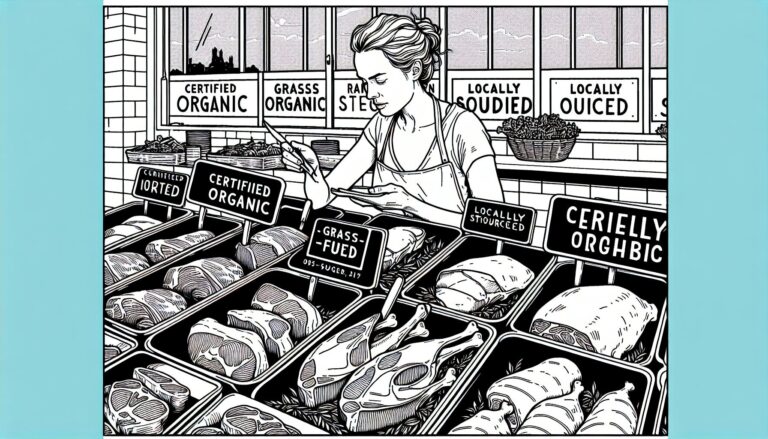As a food enthusiast, I’ve always been fascinated by the concept of seasonal eating. Not only does it enhance the flavors of my meals, but it also brings a myriad of benefits for both my health and the environment.
When I choose to indulge in seasonal fruits and vegetables, I not only savor the peak of freshness and taste but also support local farmers and reduce the carbon footprint associated with long-distance transportation.
Join me on a journey to discover the numerous advantages of embracing seasonal eating, not just for our own well-being but for the sustainability of our planet as well.
What is Seasonal Eating?
When it comes to seasonal eating, I focus on consuming fruits and vegetables that are naturally grown and harvested during specific times of the year. This means enjoying produce that is at its peak ripeness and flavor when it’s in season. I pay attention to the natural cycles of plant growth and cultivation, aligning my diet with what nature intended at different times of the year.
By eating seasonally, I support local farmers who follow sustainable practices as they provide fresh, in-season produce. I prioritize foods that are harvested closer to home, reducing the environmental impact of long-distance transportation associated with out-of-season fruits and vegetables.
Seasonal eating allows me to enjoy a diverse range of flavors throughout the year. For instance, I eagerly anticipate the sweetness of summer berries and the earthy richness of fall squash. I appreciate the variety that each season brings, knowing that it not only benefits my health but also contributes to the well-being of the planet.
Health Benefits of Seasonal Eating
Eating seasonally provides an array of health benefits that contribute to overall well-being:
- Nutrient density: Freshly harvested seasonal produce is rich in essential vitamins, minerals, and antioxidants vital for good health.
- Optimal freshness: Choosing in-season fruits and vegetables ensures they are picked at the peak of ripeness, maximizing their nutritional content.
- Variety: Embracing seasonal eating introduces a diverse range of nutrients into my diet, supporting a well-rounded nutritional intake.
- Supports digestion: Consuming foods in harmony with nature can promote better digestion and nutrient absorption, aiding in gut health.
- Hydration: Many seasonal fruits and vegetables have high water content, contributing to hydration levels and overall health.
By incorporating seasonal foods into my diet, I prioritize my health and well-being while savoring the best flavors nature has to offer.
Environmental Benefits of Seasonal Eating
When it comes to seasonal eating, reducing food miles is a key environmental benefit. By choosing local, in-season produce, I can significantly decrease the carbon footprint associated with transportation and storage of food. This means less reliance on fossil fuels and lower greenhouse gas emissions.
Another advantage of seasonal eating is promoting biodiversity. Supporting local farmers who grow a variety of seasonal crops helps preserve diverse plant species, which is essential for ecosystem balance and ensuring resilient food systems. I prioritize in-season fruits and vegetables to contribute to sustainable agricultural practices.
By embracing seasonal eating, I actively participate in the conservation of water resources. Seasonal produce typically requires less irrigation as it is naturally adapted to local climate conditions, resulting in reduced water usage compared to out-of-season varieties. This practice helps in mitigating water scarcity and promotes sustainable water management.
In addition, choosing seasonal foods means I am minimizing the need for artificial inputs such as pesticides and fertilizers. Since seasonal crops are naturally suited to local conditions, they are less prone to pests and diseases. This reduces the environmental impact of chemical use in agriculture and supports healthy soil biodiversity.
My commitment to seasonal eating not only benefits my health but also plays a vital role in protecting the environment. By making conscious choices based on the availability of seasonal produce, I contribute to a more sustainable and eco-friendly food system that prioritizes environmental preservation.
How to Start Seasonal Eating
When beginning your seasonal eating journey, it’s important to familiarize yourself with what produce is in season during each month. Start by exploring local farmer’s markets or joining a community-supported agriculture (CSA) program to access fresh, seasonal produce.
Plan your meals around seasonal fruits and vegetables. Incorporate a variety of colorful foods into your diet to ensure you’re getting a wide range of nutrients. Experiment with new recipes that feature seasonal ingredients for added culinary excitement.
Stay informed about what’s in season each month. Consult seasonal produce guides or websites to help you identify what fruits and vegetables are at their peak. Adjust your shopping list accordingly to prioritize seasonal items.
Connect with local farmers to learn about their growing practices and the produce they offer. Engage with the farming community to deepen your understanding of the benefits of seasonal eating and the impact it has on the environment.
Support restaurants and food establishments that embrace seasonal menus. Celebrate the flavors of each season by patronizing establishments that prioritize using local, in-season ingredients in their dishes.
Seasonal Eating: Tips and Tricks
Seasonal eating doesn’t have to be complicated, and with a few tips and tricks, you can easily incorporate this practice into your lifestyle. Here are some strategies to help you make the most of seasonal eating:
- Plan Ahead: Take the time to research and understand what produce is in season each month. This will guide your meal planning and grocery shopping.
- Get Creative: Experiment with new recipes using seasonal fruits and vegetables. It’s a great way to add variety to your diet and discover new favorite dishes.
- Stay Informed: Keep up to date with what’s in season by following local farmers’ markets, newsletters, or online resources. This will help you stay on track with your seasonal eating goals.
- Support Local: Connect with local farmers to learn about their growing practices and support their efforts to provide fresh, seasonal produce. Consider joining a community-supported agriculture (CSA) program to get regular access to local goodies.
- Eat Out Mindfully: Support restaurants that embrace seasonal menus. This not only benefits you by eating fresh and flavorful dishes but also shows appreciation for establishments that prioritize seasonal and local ingredients.
- Preserve the Harvest: Consider preserving excess seasonal produce through freezing, canning, or pickling. This allows you to enjoy your favorite fruits and vegetables even when they are out of season.
By implementing these tips and tricks, you can make seasonal eating a seamless part of your daily routine, reaping the benefits for both yourself and the planet.
Key Takeaways
- Seasonal eating aligns with nature’s cycles, supporting local farmers, reducing food miles, and providing peak nutrition and flavor.
- Health benefits of seasonal eating include increased nutrient density, optimal freshness, variety, better digestion, and improved hydration.
- Environmental benefits encompass reduced carbon footprint, biodiversity preservation, conservation of water resources, and minimized use of artificial inputs.
- Starting seasonal eating involves familiarizing yourself with local produce, planning meals around seasonal items, staying informed, and connecting with farmers and restaurants.
- Tips and tricks for successful seasonal eating include planning ahead, getting creative with recipes, staying informed about what’s in season, supporting local farmers, mindful dining out, and preserving excess produce for later enjoyment.
Conclusion
Incorporating seasonal eating into my lifestyle has been a game-changer. Planning ahead, trying new recipes, and supporting local farmers have not only improved my health but also helped the planet. By staying informed and embracing seasonal menus, I’ve discovered a whole new world of flavors and nutrients. Preserving excess produce ensures that nothing goes to waste, creating a sustainable cycle of consumption. Seasonal eating is not just a trend; it’s a way of life that benefits both me and the environment. I encourage you to explore the wonders of seasonal foods and experience the positive impact it can have on your well-being and the world around you.



